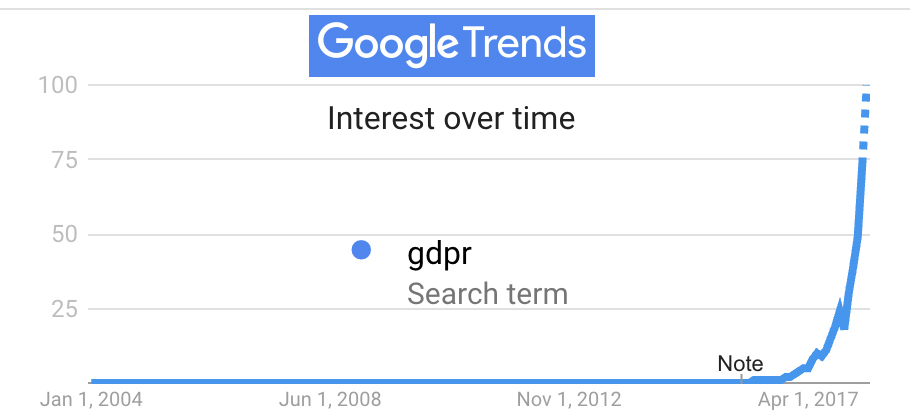For the first time since we launched ProjectVRM, we have a wave we can ride to a shore.
That wave is the GDPR: Europe’s General Data Protection Regulation. Here’s how it looks to Google Trends:
It crests just eight days from now, on May 25th.
To prep for the GDPR (and to avoid its potentially massive fines), organizations everywhere are working like crazy to get ready, especially in Europe. (Note: the GDPR protects the privacy of EU citizens, and applies worldwide.)
Thanks to the GDPR, there’s a stink on surveillance capitalism, and companies everywhere that once feasted on big data are now going on starvation diets.
Here’s one measure of that wave: my post “GDPR will pop the adtech bubble” got more than 50,000 after it went up during the weekend, when it also hit #1 on Hacker News and Techmeme. And this Hacker News comment thread about the piece is more than 30,000 words long. So far.
The GDPR dominates all conversations here at KuppingerCole‘s EIC conference in Munich where my keynote Tuesday was titled How Customers Will Lead Companies to GDPR Compliance and Beyond. (That’s the video.)
Ten years ago at this same conference, KuppingerCole gave ProjectVRM an award (there on the right) that was way ahead of its time.
ProjectVRM an award (there on the right) that was way ahead of its time.
Back then we really thought the world was ready for tools that would make individuals both independent and better able to engage—and that these tools that would prove a thesis: that free customers are more valuable than captive ones.
But then social media happened, and platforms grew so big and powerful that it was hard to keep imagining a world online where each of us are truly free.
But we did more than imagine. We worked on customertech that would vastly increase personal agency for each of us, and turn the marketplace into a Marvel-like universe in which all of us are enhanced:

In this liberated marketplace, we would be able to
- Make companies agree to our terms, rather than the other way around.
- Control our own self-sovereign identities, and manage all the ways we are known to the administrative systems of the world. This means we will be able to —
- Get rid of logins and passwords, so we are simply known to others we grace with that privilege. Which we can also withdraw.
- Change our email or our home address in the records of every company we deal with, in one move.
- Pay what we want, where we want, for whatever we want, in our own ways.
- Call for service or support in one simple and straightforward way of our own, rather than in as many ways as there are 800 numbers to call and punch numbers into a phone before we wait on hold while bad music plays.
- Express loyalty in our own ways, which are genuine rather than coerced.
- Have an Internet of MY Things, which each of us controls for ourselves, and in which every thing we own has its own cloud, which we control as well.
- Own and control all our health and fitness records, and how others use them.
- Help companies by generously sharing helpful facts about how we use their products and services — but in our own ways, through standard tools that work the same for every company we deal with.
- Have wallets of our own, rather than only those provided by platforms.
- Have shopping carts of our own, which we could take from store to store and site to site online, rather than ones provided only by the stores themselves.
- Have real relationships with companies, based on open standards and code, rather than relationships trapped inside corporate silos.
- Remake education around the power we all have to teach ourselves and lean from each other, making optional at most the formal educational systems built more for maintaining bell curves than liberating the inherent genius of every student.
We’ve done a lot of work on most of those things. (Follow the links.) Now we need to work together to bring attention and interest to all our projects by getting behind what Customer Commons, our first and only spin-off, is doing over the next nine days.
First is a campaign to make an annual celebration of the GDPR, calling May 25th #Privmas.
As part of that (same link), launching a movement to take control of personal privacy online by blocking third party cookies. Hashtag #NoMore3rds. Instructions are here, for six browsers. (It’s easy. I’ve been doing it for weeks on all mine, to no ill effects.)
This is in addition to work following our Hack Day at MIT several weeks ago. Stay tuned for more on that.
Meanwhile, all hands on deck. We need more action than discussion here. Let’s finish getting started making VRM work for the world.

